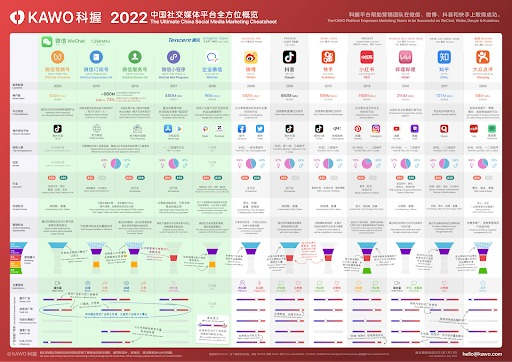
KAWO, a Chinese social media management platform, recently unveiled its "2022 Ultimate China Social Media Marketing Cheatsheet." The guide provides an in-depth overview of China's mainstream social media platforms to assist brands and agencies in understanding China's social media landscape and optimizing their social media strategies.
KAWO 2022 "Ultimate China Social Media Marketing Cheatsheet"
With its wide consumer base, the Chinese market still presents opportunities for international companies, despite the global economic downturn. But with a vastly different marketing and social media landscape, this can be a daunting endeavour.
Instead of popular social media giants like Facebook (Meta), Instagram, YouTube, TikTok and Twitter, Chinese social media is based on its own network of China-specific platforms, which exist in a deeply integrated ecosystem.
Optimizing Chinese social media for international brands requires in-depth knowledge of how these social media networks operate, and what content resonates within each platform. This understanding is especially important in light of rising traffic costs and high levels of competition within China's social media landscape. Developing an effective social media marketing strategy is a must for international companies looking to penetrate the Chinese market.
Under this context, KAWO's 2022 "Ultimate China Social Media Marketing Cheatsheet" gives a comprehensive overview of all major Chinese social media platforms, including WeChat, Douyin, Weibo, Bilibili, Xiaohongshu, Kuaishou, Zhihu, and Dianping. WeChat's overview also includes WeChat Channels, WeChat Mini Programs, WeCom, WeChat Subscription OA, and WeChat Service OA. Highlights include short summaries, monthly active users (MAU), western equivalents, top demographics, gender breakdowns, industry breakdowns, content formats, paid promotion options, and most importantly, potential marketing opportunities within each platform, as well as the niches each platform fills within the marketing and sales funnel.
Social media has streamlined the consumer purchasing experience, from initial brand discovery to the final product purchase. This is especially true in China's deeply integrated social media landscape. Unlike traditional marketing channels, social media platforms can fulfill multiple roles within the marketing and sales funnel. For example, apps like WeChat operate in an ecosystem where users can discover and compare brands, receive personalized customer service, make purchases, and recommend friends, all within the same platform. For a brand to optimize its social media marketing within China, it must understand when and how to use each platform within the context of the marketing and sales funnel.
As the world becomes increasingly connected through social media, we are starting to see a paradigm shift away from traditional marketing methods to social media marketing. Where social media platforms fulfill different, more interchangeable marketing and sales roles, marketers are adjusting their strategies accordingly to fit the new model. Producing and deploying high-quality content across the proper social media channels based on their functionality is essential for reaching target audiences, improving conversion rates, and reducing customer acquisition costs, while better serving customers and maximizing retention.
KAWO's cheatsheet was designed to help international brands and agencies identify sales opportunities on social media, and plan marketing content based on roles each platform plays in marketing and sales.
KAWO is the first and only China-specific social media management platform. The platform seeks to operate as a "central hub to effectively collaborate and manage content across the changing social media landscape." KAWO works with brands and agencies to manage their social media accounts through various content editing, approval, scheduling, and reporting functions while giving in-depth data analysis reports and competitor monitoring to empower brands to make scientific and efficient marketing decisions.
Disclaimer: IBT does not endorse the above content









